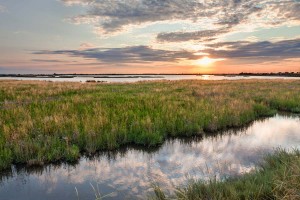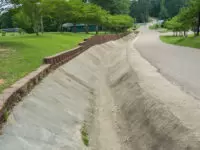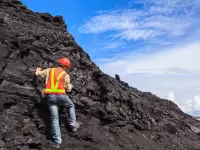
A wetland specialist works in the natural science profession assessing the health of wetlands and determining through field experimentation how human and natural activities influence a wetland's physical conditions. Wetland specialists compare flora, fauna and water levels to determine if significant changes have taken place.
What Does a Wetland Specialist Do?
Wetland Specialists strive to preserve ecological sustainability of wildlife, maintain cleanliness of water resources, remove pollutants from the wetlands and implement remediation projects. Wetland specialists use extensive scientific monitoring and analysis to gather data and draft reports.
Day-to-day duties of a wetland specialist may involve collecting soil samples, tracking aquatic wildlife and migratory birds, monitoring chemical composition of the wetlands, surveying land, and producing reports. Experience with geographic information systems and other computer modeling programs may be required for work as a wetland specialist. After researching and gathering information, wetland specialists compile data into reports and use the research findings to inform others and urge policy development.
Developments of rural areas, as well as global warming, are drying wetlands up and making healthy, functional wetlands scarce. Research is aimed at recording changes in water levels, as well as identifying the number and type of plant species within the wetland. Changes in these details usually indicate problems outside the wetlands. Wetland specialists are mainly concerned with invasive species and the preservation and restoration of wetlands.
Where Does a Wetland Specialist Work?
Wetland specialists spend a significant amount of time outdoors. Most research is done within a wetland area, which is subject to variable weather patterns. When not out in the field doing research a wetland specialist might be writing consulting reports, writing academic papers, or focusing on policy legislation and education positions.
Many consulting companies and governments hire wetland specialists to assess environmental impacts their company might make on existing wetlands. Examples of employers for wetland specialists include the US Department of Natural Resources, EPA, US Army Corps of Engineers, US Fish and Wildlife Service, and research universities.
What Is the Average Wetland Specialist Salary?
Wetland specialists, who fall under the broader BLS category of environmental scientists and specialists, earned a median salary of $73,230 as of May 2020. The job demand for wetland specialists and other environmental specialists is projected to increase by 8 percent between 2020 and 2030.*
What Is the Job Demand for a Wetland Specialist?
The future job demand for a wetland specialist is contingent on the preservation of wetlands. Across the world, wetlands are being drained to provide housing as well as farmland for humans. This has both a positive and negative impact for wetland specialists. While many work to prevent the loss of wetlands, others work in impact assessment for developments on or near wetlands.
What Do Wetland Specialists Study?
The minimum education required to become a wetland specialist is to complete a Bachelor's degree in science majoring in ecology or a similar discipline. To progress a career as a wetland specialist a Masters or Ph.D. is required. This leads to better funding, more people working under you, and might include getting papers published in widely-read scientific publications. A number of universities offer specific degrees in wetland ecology. These universities include Indiana University, LSU, and Coastal Carolina University.
Wetland Specialists must be certified to practice. Certification as a Wetland Professional In Training (WPIT) is considered a preliminary step for persons who have completed the basic educational requirements but do not meet the experience requirement. Professional Wetland Scientist (PWS) certification is then awarded to those meeting both educational and experience requirements. Once you are granted the PWS or WPIT certification you are required to maintain it by paying a small annual maintenance fee. Additionally, you are required to renew your certification every five years.
Related Degree Options for Wetland Specialists
What Kind of Societies and Professional Organizations Do Wetland Specialists Have?
- The Society for Wetland Scientists provides news, membership info, job postings, academic programs and links to journals.
- Ducks Unlimited is the world's leader in wetlands and waterfowl conservation.
*2020 US Bureau of Labor Statistics salary figures and job growth projections for environmental scientists and specialists reflect national data not school-specific information. Conditions in your area may vary. Data accessed September 2021.





